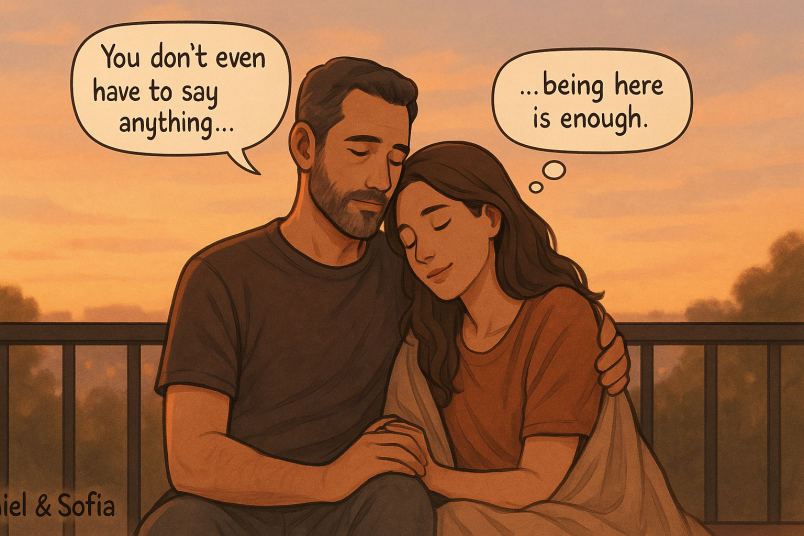What Is an Intimate Relationship? 11 Ways to Build One

Heal & Grow Daily for a Happier Relationship
Subscribe FREEKey Takeaways
Marriage.com AI Quick Summary
You know that quiet moment when you and your partner are laughing over something silly, and everything just feels… safe?
Then there are days when you feel distant, even while sitting right beside each other. It’s confusing—you care deeply, yet something feels off. Maybe the conversations don’t go as deep as they used to, or the comfort of being fully yourself isn’t always there.
It’s not about grand gestures but those small emotional nudges that say, “I see you.” Building an intimate relationship isn’t instant; it grows through trust, vulnerability, and everyday connection—especially when life gets messy and love feels complicated.
What is an intimate relationship?
An intimate relationship is a close emotional bond where two people feel safe to be their true selves—sharing thoughts, feelings, and vulnerabilities without fear of judgment.
It goes beyond physical closeness and focuses on trust, understanding, and mutual support. This connection allows partners to grow together while still honoring each other’s individuality.
A research paper published in 2022 states that emotional intelligence is significantly related to romantic relationship satisfaction.
Example: Imagine coming home after a hard day. Instead of pretending everything is fine, you open up—“I felt overwhelmed today.” Your partner listens, offers comfort, and doesn’t try to “fix” you. In that moment, you feel seen, supported, and connected. That’s the heart of an intimate relationship.
Please note:
And if this kind of closeness feels challenging sometimes, that’s okay—many couples struggle with it. Intimacy is something you build step by step, with patience and care. You’re not failing—you’re simply growing.
5 signs of an intimate relationship
Recognizing an intimate relationship isn’t always about grand gestures—it’s often found in the quiet, everyday moments. These signs reveal the emotional safety, trust, and connection that help two people feel deeply seen, valued, and genuinely understood.
1. Trust
A lot of people take trust for granted.
A research article from Michigan State University Extension states that trust is fundamental in relationships: it grows through consistent actions, honesty, respecting boundaries, and showing reliability in small moments.
Whether you trust your partner to support you, to take your side, to tell you when you’re wrong, or to simply be with you even when you’re not at your best, are all signs of a strong intimate relationship.
- Example: If you forget something important and feel safe admitting it without being judged—and your partner calmly helps you figure it out—that reliability and honesty reflect deep trust in your intimate relationship.
2. Empathy
Empathy is probably the most important characteristic in a relationship to make sure that emotional intimacy between you and your partner is well established. Without empathy, you and your partner will probably have a hard time understanding each other and being emotionally intimate.
- Example: When you’re overwhelmed and say, “I just need a moment,” your partner doesn’t take it personally. Instead, they respond with, “I get it—take your time,” showing they truly understand your feelings.
3. Safety
To be intimate with someone, you first need to feel safe around them. If you constantly feel like your mental, emotional, and physical health is being threatened by your partner, then all intimacy flies out the window. Safety and security are the foundations of intimate relationships.
- Example: You can share an unpopular opinion, cry in front of them, or admit a mistake without fear of being mocked or punished—because you know your partner will respond with care, not criticism.
4. Open Communication
Intimate partners talk honestly—even about hard things—without shutting down or attacking each other. Communication keeps the connection strong and prevents misunderstandings.
- Example: If something is bothering you, you can bring it up without walking on eggshells. Your partner listens, asks questions, and works with you—not against you.
5. Vulnerability
True intimacy requires letting your guard down and being authentic. Vulnerability helps partners connect on a deeper emotional level.
- Example: You feel safe sharing your deepest fears, like “I worry I’m not good enough,” and instead of dismissing you, your partner comforts you—proving it’s okay to be real.
Types of intimate relationships
There are four broad types of intimate relationships: Physical, Emotional, Spiritual, and Experiential intimacy. Here’s more information about them:
1. Physically intimate relationships
The meaning of sexually intimate relationships is not just that you sleep around with your partner; it’s also how comfortable you feel about touching and being touched, how you enjoy each other, and whether you’re both physically vulnerable without being too self-conscious.
- How does it look: You’re comfortable being close—whether it’s cuddling on the couch, sitting side by side, or resting your head on their shoulder without awkwardness.
2. Emotionally intimate relationships
The second type of intimate relationship is an emotional one. Emotional intimacy is when your partner makes you feel comfortable and encourages you to express yourself. If your partner is always trying to explain themselves without paying attention to your feelings, then there is a disconnect there.
- How does it look: You openly share your true feelings, and your partner listens with empathy instead of judgment or defensiveness.
3. Spiritually intimate relationships
Feeling secure in one’s own belief and respecting and showing an interest in your partner’s belief system as well is an example of a spiritually intimate relationship. This video gives you more information on how to build spiritually intimate relationships-
- How does it look: You respect each other’s beliefs or values and can talk about life, purpose, or faith with curiosity and mutual understanding.
4. Experientially intimate relationships
When a couple goes through certain life events together, they develop experiential intimacy because of these shared experiences. This helps them understand and empathize better, and makes them feel more connected. These experiences can help them build intimacy in their relationship.
- How does it look: You enjoy doing things together—big or small—and those shared experiences make you feel like a team with a deeper bond.
11 ways to build an intimate relationship
Building an intimate relationship isn’t just about closeness—it’s about trust, emotional safety, and showing up even when it feels scary. If you’ve ever wondered how to be more intimate in a relationship or struggled with a fear of intimate relationships, these steps can gently guide you toward deeper connection.
1. Spend time together
Time brings people together. Spending more time together will not only improve your experiential intimacy but will also give you and your partner opportunities to grow, change, and learn together.
According to Danica Mitchell, an experienced sex therapist:
The quality of the time you spend with your partner is important. You may not have the time for hours-long dates, but if you are fully present with one another, it will be worth it.
- Try this: Some ways you work this couple-time into your daily life is by going on walks or runs with your partner, relaxing together by watch a show, cooking meals together, going grocery shopping together, or even by just working in the same room!
2. Talk about things other than yourselves
When you’re in a relationship, it can be easy to forget the entire world around you.
Therapist Danica Mitchell further shares:
When you are in a long-term relationship, the topics tend to be the same: family, kids, work, etc. However, having interests outside your shared life provides a valuable way to maintain independence and have something to share with your partner.
But getting out of your bubble and having conversations about politics, or pop culture, or anything else can help you both develop intellectual intimacy and will change the way you see each other.
- Try this: Pick a book and talk about it for a week as you read through it with your partner or send your partner any articles or newspaper clippings that you find particularly interesting, and then having a conversation about it- maybe over a glass of wine and cheese platter.
3. Explore each other physically
After a certain amount of time, the thrill of being physically intimate with each other goes away. Try to rekindle the flame by trying something new in bed. Surprise each other and try to show physical affection whenever possible- this will help you develop physical intimacy in your relationship.
- Try this: If you want to develop physical intimacy without the sexual component, consider joining a dance class!
4. Bring down your walls
Being vulnerable in your relationships can be a great way to build intimacy. Being vulnerable can be scary, and it’s bound to leave you feeling exposed and fragile. But that’s all a part of getting emotionally intimate with your partner.
The growth and progress made in relationships stem from this vulnerability, as it pushes you and your partner to make a safe space where you both feel safe and comfortable.
- Try this: Share one honest feeling you usually keep inside—start small, and let your partner respond with care rather than perfection.
5. Plan things together
Even though it may not seem like a big deal, the act of planning itself can help you develop deeper connections. As you plan an event, say, a date or a small weekend getaway, you learn new things about each other.
The very act of telling what you like and dislike, making compromises, and deciding on things together can help you become more intimate. This is because you start to empathize and figure out what makes you tick.
- Try this: Sit down and plan one small activity—like choosing a restaurant or weekend outing—and make sure both of your preferences are heard and included.
6. Validate and reassure
Validation and reassurance are crucial actions in a relationship. Validating your partner’s feelings can make them feeling like you respect them and reciprocate the way they feel about you.
Reassurance is just as important as validation; reassuring your partner that you care about them and that you appreciate them will help open up to you more.
- Try this: When your partner shares something, respond with phrases like “That makes sense,” or “I understand why you feel that way,” and follow it with “I’m here for you.”
7. Express freely
The best way to encourage your partner to express themselves without being worried that you will abandon them is to practice what you preach.
Danica Mitchell highlights that:
If you want someone to be open with you, it helps to lead by example and be open with them first.
If you open up to them and show them that you have complete faith in them, then they feel more comfortable opening up to you.
- Try this: Tell them openly how you feel, and how important it is to you that they are welcoming. Making your expectations know will develop intimate love and understanding in your relationship.
8. Prioritize each other
To develop any form of intimacy, be it emotional or physical, prioritizing each other lays down a foundation for you to build a strong intimate relationship.
To be intimate, one needs to feel like they matter to the other person, and a way to make them feel loved is to choose them over your other priorities again and again.
- Try this: Set aside uninterrupted time—no phones, no distractions—just to talk, check in, or enjoy each other’s company, even if it’s only for 15 minutes.
9. Try new things together
Regardless of whether it makes you look like a fool or you’re a natural at it, trying new things with your partner can be a very fun experience.
By engaging in an activity that is new to one or both of you, you are being vulnerable to failing or going out of your comfort zone. This can help you bond over your new experiences.
- Try this: Pick one new activity—like a cooking class, dance lesson, hiking trail, or creative hobby—and agree to try it together with a “let’s just have fun” mindset.
10. Keep the romance alive- pamper each other
We talked about how rekindling the fire and trying new things can help you engage with your partner sexually and improve physical intimacy. However, that’s not the only thing romance can improve.
Small gestures will make your partner feel loved and appreciated. After all, romance is a big factor that mediates intimacy.
- Try this: Surprise your partner with a small act of love—like running them a warm bath, writing a sweet note, planning a cozy night in, or doing their favorite treat “just because.”
Watch this TED Talk by Mike Robbins, an author and motivational speaker, who shares how genuine appreciation strengthens relationships, boosts connection, and inspires others.
11. Practice forgiveness and let things go
Holding onto past mistakes or bringing up old conflicts can slowly chip away at intimacy. Forgiveness doesn’t mean ignoring hurt—it means addressing it, understanding each other’s perspective, and choosing to move forward without resentment.
When partners give each other grace, they create a safe, judgment-free space where love can grow stronger.
- Try this: The next time a small mistake happens, talk about it calmly, express how you feel, then agree to let it go and not bring it up again during future disagreements.
Choosing each other
Intimacy isn’t built in a day—it’s nurtured through small, consistent choices. Whether it’s listening with empathy, planning together, being vulnerable, or keeping the romance alive, each effort strengthens your bond in meaningful ways.
There may be moments of fear, discomfort, or setbacks, but these are simply parts of growing together. With patience, honesty, and mutual care, you can build an intimate relationship that feels safe, passionate, and deeply connected.
Remember—intimacy isn’t about being perfect; it’s about showing up for each other, again and again, with love.
 Tips
Tips
Write your tip or submit a video tip
All tips are reviewed before the publishing.
Share this article on
Recent Articles
Related Quizzes
Heal & Grow Daily for a Happier, Healthier Relationship
Subscribe FREE on YouTube We'd love your feedback!
We'd love your feedback!
 Expert Q&A
Expert Q&A
Ask your question related to this topic & get the support you deserve from experts.





















 Thanks for your feedback!
Thanks for your feedback!